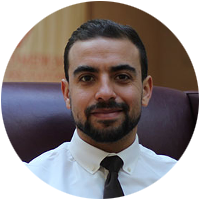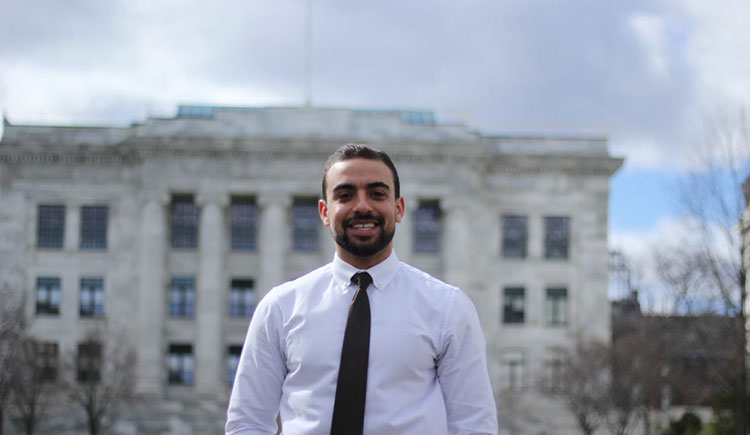Omar Abu Qamar, MD | Master of Medical Sciences in Clinical Investigation, Global Clinical Scholars Research Training
 Omar Abu Qamar, MD is a medical graduate from the University of Jordan. After graduation, he spent some time in Jordan working with NGOs, completed our Introduction to Clinical Research Training and Global Clinical Scholars Research Training programs, and worked on a corneal stem cells research project. He then moved to Boston in 2016 to start the MMSCI program and join the Beetham Eye Institute – Joslin Diabetes Center as a clinical research fellow, where he is now involved with eye imaging projects in diabetic patients.
Omar Abu Qamar, MD is a medical graduate from the University of Jordan. After graduation, he spent some time in Jordan working with NGOs, completed our Introduction to Clinical Research Training and Global Clinical Scholars Research Training programs, and worked on a corneal stem cells research project. He then moved to Boston in 2016 to start the MMSCI program and join the Beetham Eye Institute – Joslin Diabetes Center as a clinical research fellow, where he is now involved with eye imaging projects in diabetic patients.
Tell us about yourself
I moved to the U.S. from Jordan seven months ago to start the Master of Medical Sciences in Clinical Investigation (MMSCI) program. During medical school I developed a passion for ophthalmology and after graduation I reached a point where I had to decide between starting residency in Jordan or coming to the US. Visiting the US during medical school helped me realize the opportunities for clinical training and research programs here were very attractive.
Before moving to Boston, I basically spent three years learning how to do clinical research. During that time I developed a knowledge base with the Introduction to Clinical Research Training and Global Clinical Scholars Research Training (GCSRT) programs, worked with Save the Children and Palestinian refugee camps in Jordan as a general physician, and joined the Stem Cell Therapy Center to research corneal stem cells. For many around me, this was a deviation from the conservative path of a medical graduate, where you are expected to join a residency program, get married, and begin your clinical career. It wasn’t exactly clear what I was doing. People were skeptical about the ICRT and GCSRT programs at first, but they turned out to be important building blocks for being here in Boston.
What’s your impression of the MMSCI program so far?
One of the best things about the MMSCI program is that you’re able to keep it focused on your area of interest. Yes, the class work is intense, but after class everyone goes to their lab and learns how to apply their new research skills. I decided to keep my research ophthalmology focused, so I work at Joslin Diabetes Center in the Beetham Eye Institute (BEI) with an amazing mentor, Dr. Jennifer Sun.
We’re working on an imaging project with diabetic patients, directed specifically at the back of the eye. Using the images we collect, we try to come up with prediction models that can tell us how diseases will progress over time or how they will respond to treatment. Considering the current standard for treatment is an eye injection, our project has amazing potential. I think if you were to go into the street and tell anyone you’re going to inject something into his or her eyeball, that’s going to be a hard sell. If we can save someone from that intense treatment, that will be a great achievement.
How did you get matched for the mentored research experience? What was that process like?
Once you get accepted into the MMSCI program you have to apply for mentoring. I didn’t know I would end up at Joslin when I started. My initial research was focused on Mass Eye and Ear since it’s the biggest eye hospital in Boston. One meeting led to another, and fortunately I ended up working with Dr. Sun as my primary mentor.
Working with Dr. Sun, Dr. Aiello and the rest of the team at BEI is thrilling. They led landmark studies that changed the practice of diabetic retinopathy, and I cited their work many times in my GCSRT capstone project. The fact that I went from reading papers citing the ‘godfathers’ of diabetic retinopathy to being a part of their teams is mind blowing. Not to forget the fact that the very first laser invented to treat diabetic eye complications is practically next-door. I can see it with my own eyes.
How did your research foundation from ICRT and GCSRT prepare you for the Master’s program?
They both helped. 100%. Especially for the first MMSCI workshop, which was mainly focused on biostatistics and epidemiology. During the blended programs you learn an incredible amount, though the Master’s program offers an added dimension of in-person interaction, especially for STATA. While I still consider myself a programming novice, it’s one of those skills that really takes practice. The fact that I had been exposed to it before starting the MMSCI program gave me a slight advantage and it took less time and effort for me to digest the information from our workshops.
When I started my work for the mentored research project, I already had a knowledge base of various study designs and methodology as well as advanced skills in scientific writing and statistical analysis. I was exposed to all of these things during the blended-programs and they became great assets for my work at Joslin.
What have been some of the program highlights?
As I mentioned before, my favorite thing about this program is the ability to keep your research focused on your own area of interest. Second, the curriculum is designed very well. Over the past six or seven months there’s been a nice harmony to everything, specifically to how epidemiology and biostatistics are co-taught. Then you have clinical trial modules that add another perspective to learning. One day we had the former FDA commissioner in class to discuss the regulation process. A few classes later we had representatives from OptumLabs, who spoke about deep learning machines, which is the future of imaging research. I was sitting there wide-eyed, like “what is this?”
Also, the level of instructors is wonderful. I feel very privileged to sit in a room with my classmates and learn from people who changed research guidelines or developed a new statistical method. The researchers you used to cite in papers are now sitting right in front of you. It’s impressive.
I want to highlight the student aspect as well. Although my cohort comes from very different backgrounds, it’s amazing how many similarities we share. We are all driven to learn and contribute to the medical literature of our specialties. The international nature of the cohort probably adds to the closeness. Even though I’m away from my family and friends in Jordan, I feel like I have a family here. It’s one of the best things about this program.
How has the MMSCI program impacted your skill building?
Everything in the MMSCI curriculum gives me something new to take home. The skills that I’ve gained can be applied directly to my research projects. I can learn something in class, go back to the lab and discuss it with my team, and implement it right away.
In terms of my goal with MMSCI, it’s the same goal I had after the ICRT and GCSRT programs, which is to be an independent clinician-researcher. For someone at my level, even after the ICRT and GCSRT programs I still needed a mentored research experience. There are things that cannot be taught by lecture alone, to really get a deep understanding the learning has to be hands-on. You have to live in it. After these two years, when I say my title is 'physician-scientist,' I really want to be a physician-scientist, someone who dedicates part of their time to seriously conduct research. Advancing my field through research is something that will definitely be part of my career for as long as I’m alive and working as a doctor.
Learn more about the Master of Medical Sciences in Clinical Investigation and Global Clinical Scholars Research Training programs. Please note, the Introduction to Clinical Research Training program has been reformatted into the course offering, Foundations of Clinical Research.
Written by Chike Lawrence-Mitchell
